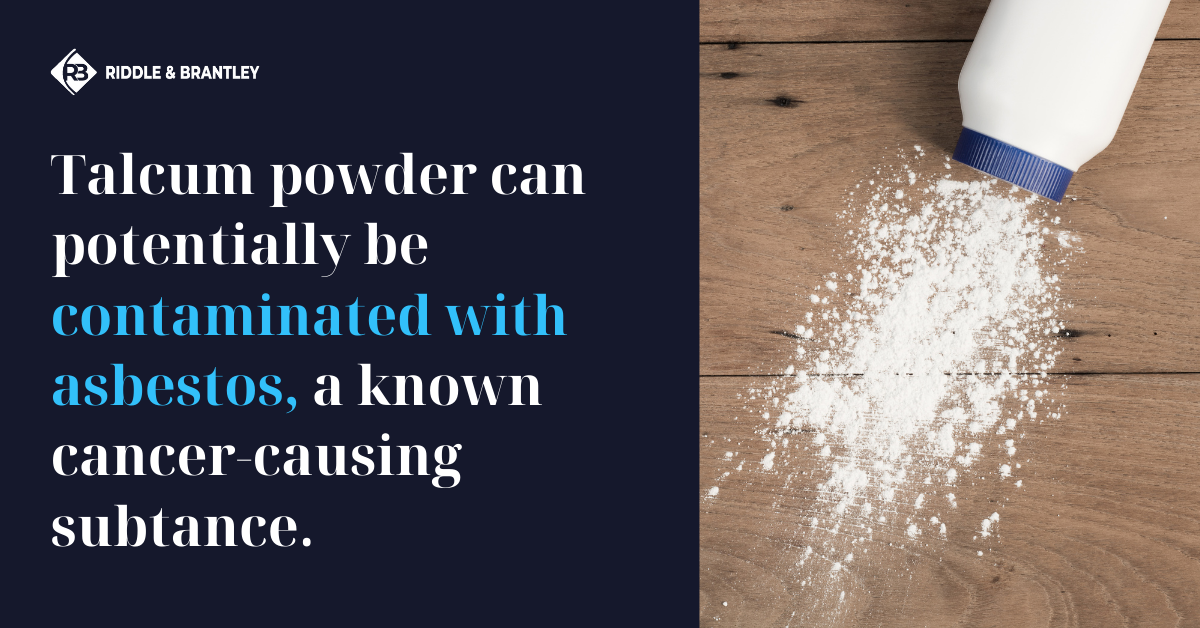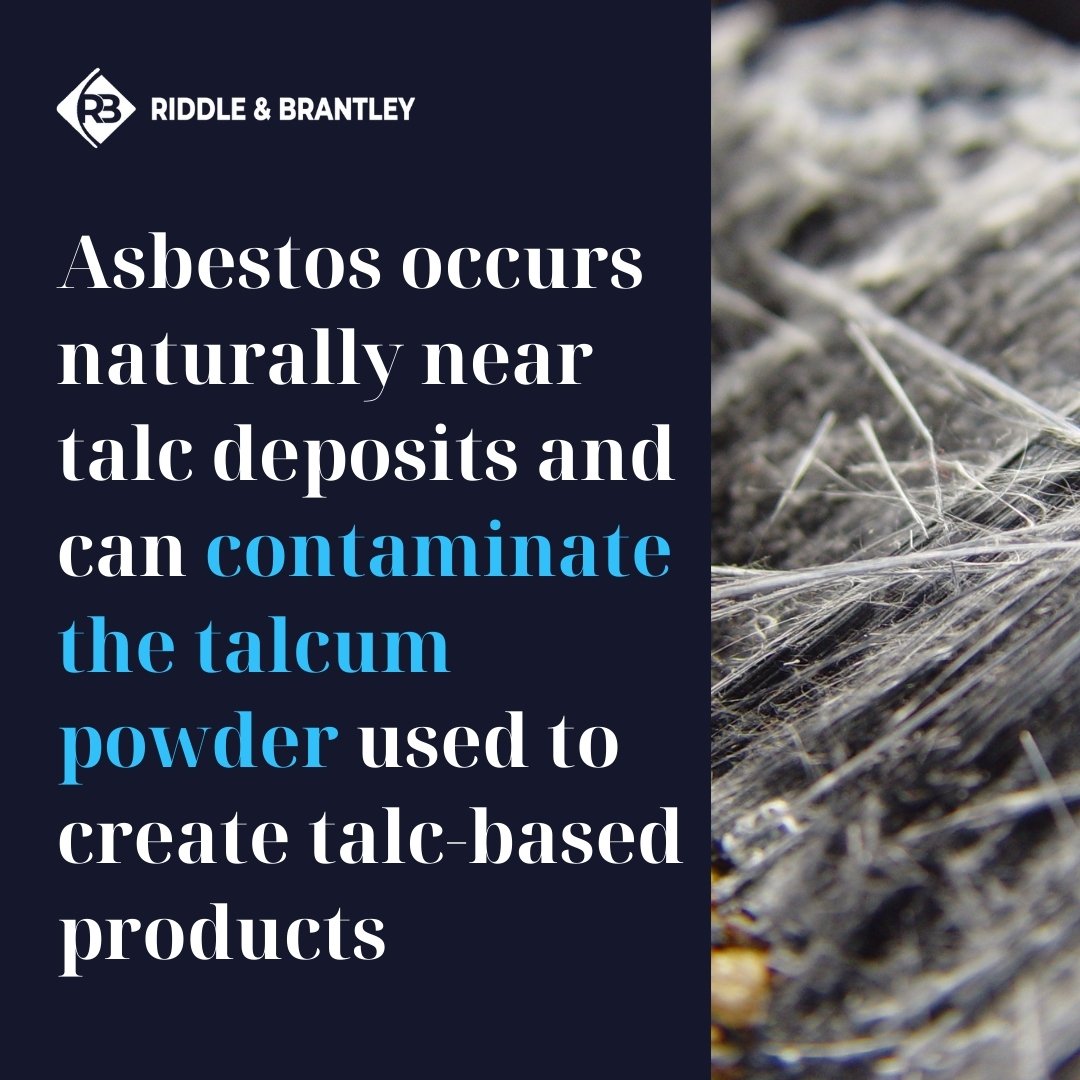How Does Talcum Powder Cause Cancer?
Since as early as 1971, researchers have warned of a link between the use of talcum powder — a powder made from talc and often used in popular baby powders and cosmetics — and the development of certain cancers such as ovarian cancer, endometrioid ovarian cancer, and mesothelioma. Many of our clients are rightly concerned and wondering, “How does talcum powder cause cancer?”
Regardless of the warnings, many popular cosmetics and personal care product manufacturers, such as Johnson & Johnson, have continued to manufacture talc-based products, potentially putting millions at risk.
 If you have used a talc-based baby powder or other product and later developed cancer, you might be wondering how does talcum powder cause cancer, and you may have grounds for a talcum powder lawsuit.
If you have used a talc-based baby powder or other product and later developed cancer, you might be wondering how does talcum powder cause cancer, and you may have grounds for a talcum powder lawsuit.
If you believe your ovarian cancer or endometrial ovarian cancer was caused by using Johnson & Johnson talcum powder, please call 1-800-525-7111 today for a FREE, no-obligation consultation.
There is no obligation and you won’t pay any attorney fees unless we win your case and you receive financial compensation.
Call 1-800-525-7111 today for a free case review concerning your potential talc-based baby powder cancer claim or lawsuit against Johnson & Johnson.
IMPORTANT: As of August 2023, we can no longer accept claims involving mesothelioma potentially linked to talcum powder, only those involving ovarian cancer or endometrial ovarian cases, due to developments in this litigation.
In this blog post, we’ll examine the question, “How does talcum powder cause cancer?”, and also discuss options for those who may have a potential baby powder cancer claim.
What is Talcum Powder and How Does It Cause Cancer?
Talcum powder is a powdered form of the mineral talc, which is at its elements a combination of magnesium, silicon, and oxygen. It is an excellent moisture-absorber and has been used for decades in products such as baby powder, cosmetics, and adult body powders to absorb moisture and oils and prevent rashes.
Certain talc-based products have also been found to contain asbestos, which has been classified as a known carcinogen by the American Cancer Society.
Asbestos and Cancer Risk
To answer the question, “How does talcum powder or baby powder cause cancer?”, it’s best to first examine the link between asbestos and cancer.
What is Asbestos?
 Asbestos is a naturally occurring substance and one that can be very dangerous to human health. It regularly takes the form of long, thin strands bunched together and is very brittle, often breaking down into microscopic particles that can be swallowed or inhaled.
Asbestos is a naturally occurring substance and one that can be very dangerous to human health. It regularly takes the form of long, thin strands bunched together and is very brittle, often breaking down into microscopic particles that can be swallowed or inhaled.
Asbestos is found all over the world in soil and rocks, including in some of the mines where talc is extracted for use in the manufacturing of talcum powder.
Asbestos has been used in many applications for hundreds of years, most commonly as an insulating material. However, in the mid-20th century, it was discovered that inhaling asbestos into the lungs can cause scarring of the lungs and inflammation, and dramatically increase an individual’s risk for cancer, especially lung cancer and mesothelioma.
Asbestos exposure has been most often linked to the following cancers:
- Mesothelioma
- Lung cancer
- Laryngeal cancer
- Ovarian cancer
- Endometrial ovarian cancer
How Does Talcum Powder Cause Cancer?
The mineral which talcum powder is made from, talc, is commonly found alongside naturally occurring asbestos. If the talc is not carefully mined and extracted, it can become contaminated with asbestos. When the talcum powder is used, asbestos can enter the lungs, causing irritation and increasing the consumer’s risk of cancer.
Due to the presence of asbestos contamination in many talcum powders, studies show that using talcum powder can put people at risk for a variety of cancers including:
- Mesothelioma
- Ovarian cancer
- Endometrial ovarian cancer
- Lung cancer
- Laryngeal cancer
“Does Johnson & Johnson talc-based baby powder cause cancer?”
In October 2019, the FDA issued a voluntary recall of certain lots of Johnson & Johnson baby powder that were found to contain asbestos contamination, citing cancer risk associated with the product.
If you have used a Johnson & Johnson talc-based product and were diagnosed with ovarian cancer, endometrial ovarian cancer, or mesothelioma, call 1-800-525-7111 today for a FREE consultation concerning your eligibility for a talcum powder lawsuit.
As always, there is no obligation and you won’t pay any attorney fees unless we win your case and you receive compensation.
“They turned a heartbreaking situation completely around.”
–Tonya Taylor, Riddle & Brantley client
“I’ve Used Talcum Powder and Developed Cancer, What Should I Do?”
Manufacturers of talc-based products like Johnson & Johnson have allegedly known about elevated cancer risk due to asbestos contamination for years and have failed to warn consumers.
At Riddle and Brantley, we have unparalleled experience fighting for the rights of our clients against potentially negligent companies like Johnson & Johnson. Since 1985, we’ve obtained millions of dollars in compensation for deserving victims (see disclaimer below), and we would love to help you if we can.
For a FREE consultation with an experienced talcum powder lawyer, please call 1-800-525-7111 today.
The consultation is free, there are no upfront costs, and because we work on a contingency basis, you won’t pay a dime in attorney fees unless we win your case and you receive compensation.
“They made a hard time in my life easier to endure.”
–Melissa C., Riddle & Brantley client
Call 1-800-525-7111 today and let’s review your claim.
Justice Counts for those who have suffered from cancer potentially due to asbestos contamination in Johnson & Johnson talc-based baby powder, and we’d love to help you if we can.
*** Disclaimer: The results mentioned are intended to illustrate the type of cases handled by the firm. These results do not guarantee a similar outcome, and they should not be construed to constitute a promise or guarantee of a particular result in any particular case. Every case is different, and the outcome of any case depends upon a variety of factors unique to that case.